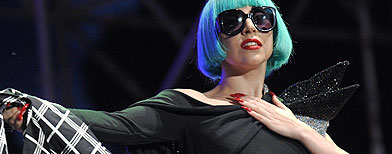You've heard the story. Plucky young girl rises from the 'hood and uses sexuality, shock value and catchy pop tunes to sell millions of albums and singles worldwide, catapulting her to major rock icon status. It's a formula that works. First it was Madonna, now it's Lady Gaga.

Wherever she travels, masses of young adoring fans gather at the doorsteps of Lady Gaga's hotels. These fans, identifiable to each other by their signature "claw" hand waves, are known as Little Monsters. It is fanhood like this that separates the "pop singers" from the "pop stars."
Like Madonna before her, Lady Gaga is a bit of a shockaholic. But the most surprising development to date is not the meat dress she wore to the MTV Video Music Awards; not the giant egg she emerged from at the Grammys; and, not the swallowing of a rosary in her "Judas" video that incited calls of blasphemy. No. The most shocking thing yet is that a group of academics at the Antwerp Management School in Belgium have dissected the 25-year old's stardom and declared her a role model for 21st century business.
According to Martin Kupp, co-author of the case study, "Lady Gaga: Born this Way?" here are five lessons that business people can learn from the Gaga (or as the Financial Times recently called it, "The School of Gaganomics").
1) Be authentic
Forget about Perez Hilton and his motto of "fake it 'til you make it." Lady Gaga proves that real success comes from being the real deal. She is earnestly passionate about theatre, fantasy and magic. Yet unlike her peers, you will never find her lip-synching at live performances. She studies the masters of visual art and poetry and she writes her own songs. When it comes to your products and services, if you want to make it big, never, ever fake it. Crap in equals crap out. Instead, deliver the best quality you can, honestly and consistently.
2) Embrace social media
By tweeting frequent messages, updates and shout-outs to her Little Monsters, Lady Gaga directly connects with her fans, keeping them freshly fed with tidbits and a sense of personal interaction. Twitter, Facebook and other social media can help promote your brand in a cheap, fast and voluminous way. Fans, friends and followers feel an increasing sense of loyalty when they feel like they are "in the know" and are quick to spread the word about brands they like to their own social groups.
3) Think cross-genre
Lady Gaga never hesitates to interweave her music with other disciplines, such as fashion and performance and visual art. Yes, you say, but I own a bakery, how am I supposed to cross over to other industries? Consider inviting local artists to use the wall space of your shop as a gallery. Team up with an ice-cream shop for a cross-promotional 'buy one, get one free' weekend. Invite local musicians to come and play outside your shop on the weekend. (If cross-genre doesn't work for you, maybe try cross dressing? Another successful Lady Gaga strategy.)
4) The 360 deal
This is a new business model being pioneered in the music industry and Lady Gaga is an early adopter. Her music company, Interscope Records, receives a percentage of revenues from all of her commercial activities, not just her recordings. The 360 is a life-preserver for recording companies who have lost 40 per cent of their value over the past seven years by doing things the old way. The idea here is that if you want solid backing from your investors, you must show them that you can bring in new revenue streams and help them to diversify their investment.
5) Show some love
Whether it's sending out cups of hot chocolate on a cold winter's night as they huddle outside her hotel, or providing free video clips to download from her website, Lady Gaga treats her Little Monsters with respect and appreciation. As a result, they respond with fierce loyalty and they multiply like rabbits. "Little Monsters are a community," she recently told actor Stephen Fry in an interview for the Financial Times. "It's kind of nice that wherever I go, they create a little home for me."
Cracking a different egg
Overall, Mr. Krupp and his associates concluded that their case study on Lady Gaga could teach businesses "how an individual or an organization can shake up an established industry merely by framing and answering the fundamental strategic questions: 'Who is the customer,' 'What do I offer this customer,' and 'How do I create value for the customer — and ultimately myself' differently."
Failing that, you can always roll out a giant egg…
No comments:
Post a Comment